Many discontinued consoles have since drawn new breath, thanks to the efforts of fans with the tech savvy to make their visions and ideas a reality. Everything from the Atari 2600 to the Turbo Grafx-16 has some sort of homebrew scene. The Genesis, on the other hand, has been more muted in its revival – though some believe that the upcoming Beggar Prince will change that – and most efforts have been limited to hacking existing ROMs. An example of this can be seen in our previous installment of Hacks & Homebrews, where we looked at the Genesis Super Mario World game.
Why so little homebrew love for the Genesis then? Could it be the proposed lack of power of the hardware? Not likely, given the relative ease in programming most 2600 and Colecovision hackers have demonstrated. A lack of willingness, then? Hardly. The Genesis has a large and devoted fan base. Most likely, the reason lies in a lack of hands-on knowledge and development tools. Even with these restrictions, some would-be programmers are tinkering away at the Genesis, and they’re slowly but surely unveiling her secrets and hidden potential.
I must make one thing clear about the projects discussed below: You mustn’t compare them to actual finished product, and should instead take them for the technical strides they represent. We’re looking at what could have been, and it wouldn’t be fair to place them side by side with fully completed games.
Something Simple
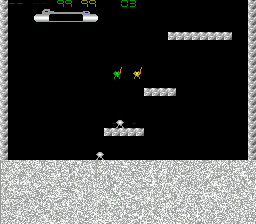 Not every homebrew effort has to be a huge and expensive undertaking. In fact, some of the most fun games around are quite simple in design and scope. I again point to those 2600 games as proof of this. Play a few rounds of Fall Down and tell me you can’t see the genius inherent in such simplicity. Not all of them are as fun as that game, but are already showing potential. This is the realm into which most Genesis homebrew efforts fall, and among them is Astro Duel, by RJSoft. Basic in every sense of the word, Astro Duel is exactly what its name implies. Two ships buzzing around each other in space, blasting mindlessly to be the first to knock out their opponent’s shields. There is nothing to really note here, and the game gets dull after a few minutes. I really couldn’t muster enough interest to play long after I’d won the first round, and I doubt you will to. Still, I have to give RJSoft credit, as Astro Duel is one of the few Genesis homebrews I’ve played that was actually solid. With no flickering or lock ups and responsive control, it seems to be more of a test for the developer to get a hang for working with the hardware. Hopefully, RJSoft’s future projects will be more complex.
Not every homebrew effort has to be a huge and expensive undertaking. In fact, some of the most fun games around are quite simple in design and scope. I again point to those 2600 games as proof of this. Play a few rounds of Fall Down and tell me you can’t see the genius inherent in such simplicity. Not all of them are as fun as that game, but are already showing potential. This is the realm into which most Genesis homebrew efforts fall, and among them is Astro Duel, by RJSoft. Basic in every sense of the word, Astro Duel is exactly what its name implies. Two ships buzzing around each other in space, blasting mindlessly to be the first to knock out their opponent’s shields. There is nothing to really note here, and the game gets dull after a few minutes. I really couldn’t muster enough interest to play long after I’d won the first round, and I doubt you will to. Still, I have to give RJSoft credit, as Astro Duel is one of the few Genesis homebrews I’ve played that was actually solid. With no flickering or lock ups and responsive control, it seems to be more of a test for the developer to get a hang for working with the hardware. Hopefully, RJSoft’s future projects will be more complex.
Other simple homebrews that are around are Moon Base and a great version of Berserk, complete with voice. Moon Base takes a bit getting used to, and it took me a while to figure out exactly what the heck I was supposed to be doing. That’s probably my main peeve with most of these homebrew titles. There is little instruction and even the demo screens don’t show enough for you to get a decent grasp on what’s going on. It took a lot longer than it should have for me to actually begin enjoying Moon Base, and that simply shouldn’t be.
Not a homebrew by any means, Berserk is the same arcade classic you’ve played before,and it’s still just as much fun. The controls were a bit twitchy sometimes, but overall was very faithful to the original. Evil Otto is as much as bastard now as he was way back when, although I did find that he appeared a little sooner than I remembered. Needless to say, he quickly commenced to smiley my ass into oblivion and then make his trademark I owned you technospeal comment afterward.
Things are moving a bit slowly in terms of the actual amount of games being created, and most of the projects done so far are still at the 2600 level, but as tools become more readily available and interest grows, things should pick up in time. I actually found some of these simple releases to be quite fun, and feel that the homebrew community really needs a place where it can converge and share knowledge and experiences. Who knows, maybe someday Sega-16 will become the AtariAge of the Genesis homebrew scene!
Something Spiffy
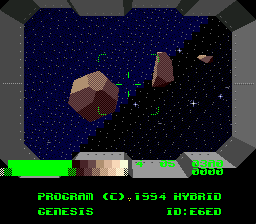 Back in the mid 90s, there were quite a few experiments going on involving the use of polygons and 3D models on the Genesis. Virtua Racing was at the forefront of this movement, though it made use of a special chip for its graphics (of course Genesis games like M1 Abrams Battle Tank used polygons long before this). Around 1994, Hybrid began working on a Genesis version of the game Elite (versions for the Game Boy and Atari 800 were also in the works). Little was actually completed, and what’s available is little more than your ship orbiting a space station amidst an asteroid field. Everything is rendered in flat-shaded polygons, and there are some neat lighting effects whenever you fire the ship’s laser cannon (you can’t destroy anything, since no collision detection was implemented), but that’s about all there is to it. I’m not sure exactly as to what this version of Elite would have played like if finished, but it reminds me a whole lot of the 32X shooter Darxide. Like the other games mentioned here, its significance is mostly technical. It still intrigues me though. It would really have been nice to see this one finished.
Back in the mid 90s, there were quite a few experiments going on involving the use of polygons and 3D models on the Genesis. Virtua Racing was at the forefront of this movement, though it made use of a special chip for its graphics (of course Genesis games like M1 Abrams Battle Tank used polygons long before this). Around 1994, Hybrid began working on a Genesis version of the game Elite (versions for the Game Boy and Atari 800 were also in the works). Little was actually completed, and what’s available is little more than your ship orbiting a space station amidst an asteroid field. Everything is rendered in flat-shaded polygons, and there are some neat lighting effects whenever you fire the ship’s laser cannon (you can’t destroy anything, since no collision detection was implemented), but that’s about all there is to it. I’m not sure exactly as to what this version of Elite would have played like if finished, but it reminds me a whole lot of the 32X shooter Darxide. Like the other games mentioned here, its significance is mostly technical. It still intrigues me though. It would really have been nice to see this one finished.
Something to Look Forward to
Here’s where we get a glimpse of future potential. Although there aren’t any true homebrew “games” made that fully utilize the potential of the Genesis, there are a few demos that show off what can actually be done. Two of them stand out in my mind, from a purely technical standpoint, and I am eager to see what else could be accomplished with enough time and skill. Both are video only, and although they are heavily pixilated and sometimes a bit hard to make out, you have to remember that they are running on standard Genesis hardware, with no special chips or anything.
The first is a thirty second sequence from The Matrix, that famous scene where Neo dodges Agent Smith’s bullets in slow motion (the birth of bullet time?). It’s not much, but as I said, it’s running on a Genesis! You may remember some video-like scenes used in the introduction to Scavenger’s Red Zone (if not, go find a copy and watch it, now!). The video in this clip isn’t as clean as that, but that’s because it’s actual video. It’s green, I know, but so what? Who’d have thought we’d ever see any more than a few seconds of FMV in cartridge form, let alone thirty seconds worth? All it’s missing is a sound bite of Keanu Reeves saying “whoah” to be complete.
Moreover, this wasn’t done by some big budget game publisher with a huge team of designers, but by a fan with a lot of time on his hands. Think about what could be done with the right resources.
The second video is far more impressive. It’s a full scene from 20th Century Fox’s film Ice Age, where Scrat the squirrel pursues his beloved acorns until they get him into more trouble than he ever imagined. This is a full scene, as opposed to the small Matrix clip, and it’s astounding to think that it’s running on basic 16-bit Sega hardware. Whoever did the compression deserves a hearty round of applause, and I can only imagine that they’ll be able to clean up the video in time. Could you imagine homebrew games with CG-animated cut scenes, or intro and ending movies a few minutes in length each? All this on a Genesis cart!
I think the most impressive thing about the Ice Age demo is its length. A full scene, clear enough to make out and enjoy, is quite a feat for a homebrew programmer. I knew the Genesis had untapped potential, but it never occurred to me that things like this could be done without the backing of a major publisher. As with the Matrix clip, this one has no sound and lacks any color distinction, and it’s heavily pixilated. I would presume this was more of an exercise in compression techniques than anything else. Impressive nonetheless, though.
Homebrew Genesis
It would appear that Sega was quite wise when they chose the name “Genesis” for their console in North America. As we can see by the growing homebrew scene, there’s a rebirth in the making for it, and great strides are being made every day. SuperFighter Team’s localization of Beggar Prince is a prime example of what a dedicated fan base can do, and these short-but-sweet homebrew efforts clearly demonstrate that there is much more to be done with the Genesis than mere Sonic The Hedgehog hacks (although we love those too). I can’t wait to see what the future will bring.

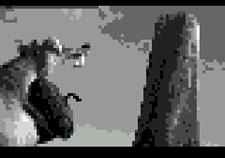
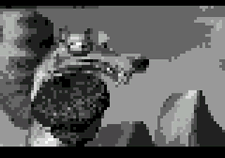

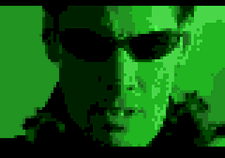
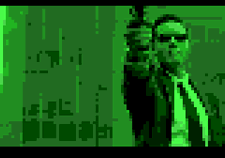
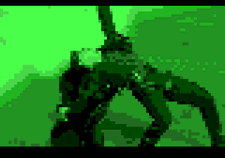
Recent Comments